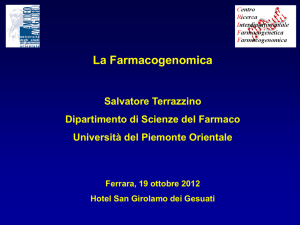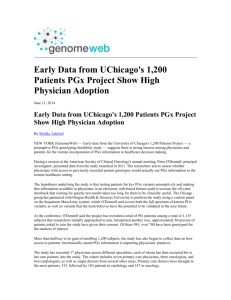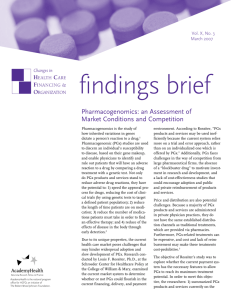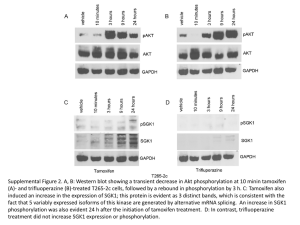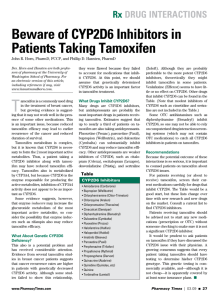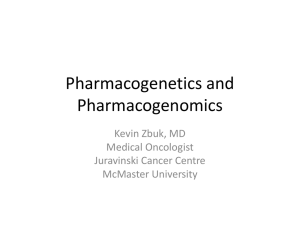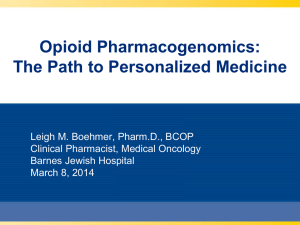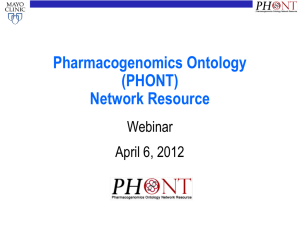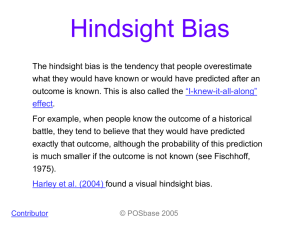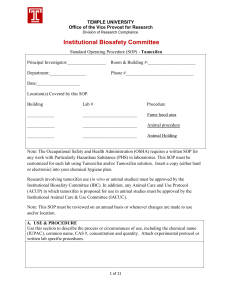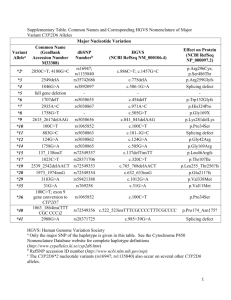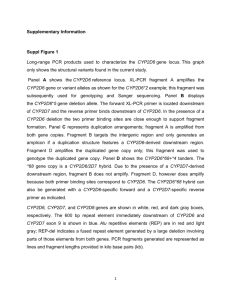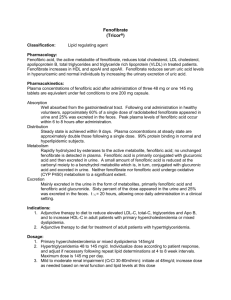Cancer-GTx-AMDPA
advertisement
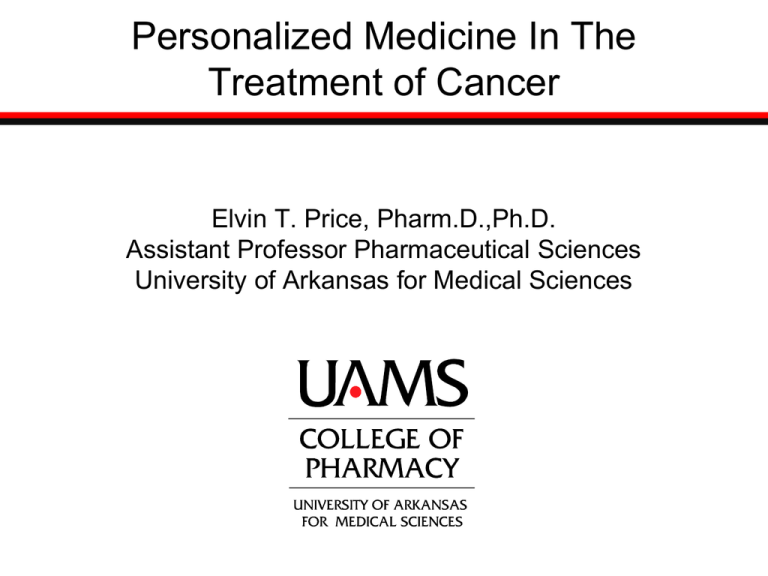
Personalized Medicine In The Treatment of Cancer Elvin T. Price, Pharm.D.,Ph.D. Assistant Professor Pharmaceutical Sciences University of Arkansas for Medical Sciences Objectives • Provide an introduction to the principles of pharmacogenetics/genomics (PGx) and personalized medicine (PM) • Describe the clinical relevance of PGx/PM to the management of cancer • Provide insight on the future of PGx/PM and cancer Time Magazine May 27, 2013 “Her preventive mastectomy raises important issues about genes, health and risk” Personalized Medicine Is Headed Your Way • Direct to consumer genomics companies are becoming increasingly popular and the prices are becoming increasingly affordable. Personalized Medicine Is Headed Your Way Personalized Medicine Is Headed Your Way AMDPA and NMA Members Personalized Medicine Is Headed Your Way Introduction • Clinical observations of inherited differences in drug effects were first documented in the 1950s, giving rise to the field of pharmacogenetics, and later pharmacogenomics. • The early pharmacogenetic examples were those with distinct phenotypes that could be easily characterized, understanding of the molecular basis for the phenotypes came later. Genetic Variation Genetic Variability Influences Response to Pharmacotherapy Genetic Variability Influences Targets of Pharmacotherapy Genetic Variability Influences Drug Metabolism Enzymes Genetic Variability Influences Drug Metabolism: Transporters Moving Towards Pharmacogenomics Ann Intern Med 2006;145:749. Pharmacogenomics TARGETS TRANSPORTERS PHARMACODYNAMICS METABOLIZING ENZYMES PHARMACOKINETICS Variability in Efficacy/Toxicity The Goal of PGx and PM Patients with same diagnosis Predicted good response to tested drug Predicted poor or nonresponse Use different drug Predicted increased toxicity risk Decrease dose or use different drug PGx Biomarkers Are Useful When Prescribing Tamoxifen Estrogen Receptor Status Influences Response To Tamoxifen Tumor Status Estrogen Receptor Negative Estrogen Receptor Positive CYP2D6 Genotypes Influence Response To Tamoxifen CYP2D6 and ABCC2 Genotypes Influence Response To Tamoxifen CYP2D6 and ABCC2 Genotypes Influence Response To Tamoxifen CYP2D6 and ABCC2 Genotypes Influence Response To Tamoxifen Mid CE Exam • Based on the previous slides, predict a response to tamoxifen for the following patient: • 55 y/o with Estrogen receptor negative tumors and is a CYP2D6 poor metabolizer. Patients with same diagnosis Predicted good response to tested drug Predicted poor or nonresponse Use different drug Predicted increased toxicity risk Decrease dose or use different drug Breakthroughs In BCA PGx Hit The Popular Press and Scientific Literature Simultaneously Breakthroughs In BCA PGx Hit The Popular Press and Scientific Literature Simultaneously Breakthroughs In BCA PGx Hit The Popular Press and Scientific Literature Simultaneously Current Trends Summary • The rapid advances in genomics technology is being embraced and maximized in the treatment of cancers • These advances are also discovering molecular links to other disease states that are associated with cancer risks • Many drugs used in the treatment of cancers are being released with companion genetic diagnostic tests Current/Future Directions: Big Data Gene Expression Patterns Link Previously Unrelated Diseases Breast Cancer Cell Expression Patterns Link to Other Diseases Future Directions in BCA PGx Future Directions in BCA PGx Current/Future Directions: Clues From Big Data Current/Future Directions: Clues From Big Data The ACCORD Study. Simvastatin + Fenofibrate in Type 2 Diabetes Current/Future Directions: Clues From Big Data Fenofibrate Effects on Nuclear Hormone Receptor Expression in Endothelial Cells Manuscript in prep. ET Price Current/Future Directions: Clues From Big Data Fenofibrate Effects on Nuclear Hormone Receptor Expression in Endothelial Cells Manuscript in prep. ET Price Networked Analyses of Genetic Variants Will Identify Additional Cancer Risk Genes: ABCRP Pilot Proposal Current Directions in PGx-PM Patients with same diagnosis Predicted good response to tested drug Predicted poor or nonresponse Use different drug Predicted increased toxicity risk Decrease dose or use different drug Current Pharma Strategies Current Pharma Strategies Current Pharma Strategies Current Pharma Strategies Current Pharma Strategies FDA Perspective On PM FDA Genomics Group of CDER Link To FDA PGX Information • http://www.fda.gov/Drugs/ScienceResearc h/ResearchAreas/Pharmacogenetics/defa ult.htm Summary Q/A

